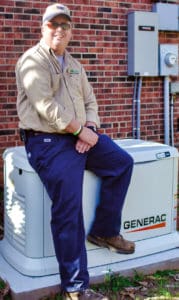In September 1989, Hurricane Hugo wreaked havoc across our area, leaving thousands without power. Who knew that our inland towns and communities would be torn apart by 90 mph winds? Like many weather events since, we can see how storms can be unpredictable—sometimes devastating.
Despite our best planning efforts, storms prove no co-op can prevent all outages. We at YEC pride ourselves on providing reliable service to our members. We do our best to prepare for the worst. That includes increasing YEC’s underground distribution system from 445 miles of underground line to 1,938 miles of underground line since 2003. It means maintaining a true five-year right-of-way maintenance plan to lessen the number of downed trees. Rest assured that every outage is addressed with dedication. Our crews work through wind and rain to restore service as quickly and safely as possible.

Although we pray storms stay clear of our service area, no one can guarantee the weather. Holding true to our commitment to look out for you, we have researched another way to provide you with the power you need, even in the worst storm. YEC has become a certified Generac dealer, working with a local installer to provide members the option to purchase a whole house generator at a discounted rate. We understand that electricity is a necessity and we want to do our part, even when it might be out of our control, to keep your power on. If you have any questions about purchasing a generator for your home, please contact Energy Services Coordinator Brent Clinton at Brent.Clinton@yorkelectric.net or apply here online.
[PDF] Generac Response Series Brochures
1.84 MB 391 downloads
Tried and true, tested for you
YEC’s 35-year employee Oliver Dowdle was the first participant in the generator program. Before marketing the product to our community, we wanted to be sure it was the right choice to offer members. Who better to test the product than our own safety coordinator? Dowdle has been pleased with the results. As he notes, “I wanted to install a generator to increase reliability. When I’m out working a storm, it’s nice to know my family has power at home.”
We look forward to serving your needs with this program, helping you stay powered on all the time.

![]()
Paul Basha
President and Chief Executive Officer
Proposed bylaw changes for York Electric
York Electric Cooperative encourages members to review the proposed bylaw changes that will be voted on at the Annual Meeting of Members. The full document showing these material changes, along with some additional typographical corrections, is available for download here.
Right of Way Maintenance FAQ
The ROW is cleared by cutting, trimming, mowing and where permissible, applying herbicides. In most cases, all shrubs, brush and trees are removed under primary (main), overhead power lines. They are also removed, as and around secondary, low-voltage power lines that bring power from the transformer to your meter. Cutting and trimming are done by trained, professional utility tree trimmers using specific and proven standards typical to the industry.
ROW refers to the corridor or pathway an electric line follows, whether it’s along the road or through the woods. ROW provides utility crews with access to lines for improvements, maintenance, and repairs. It also provides an operational safety zone between the electric lines and trees, buildings, etc. On the majority of its lines, York Electric holds easements that give it the right to clear land 15 feet from either side of the wire.
A clear ROW minimizes outages, improves power quality, reliability, and safety.
- Causes power outages
- Causes lights to blink
- Obstructs visual inspections, making repairs difficult and costly
- Blocks access for maintenance and repairs, causing delays
- Wastes electricity by drawing it to the ground
- Becomes a fire hazard
- Becomes a safety hazard for utility workers and members
- Children and adults should never climb, trim, or touch trees that contact power lines!
York Electric’s ROW maintenance program balances the preservation of natural habitats against the service reliability needs of our members and the safety needs of the general public. In fact, it can actually benefit the ecosystem and other natural environments. ROW maintenance efforts create open areas that encourage the growth of wildflowers, ferns, grasses, flowers, berries, and other low-growing shrubs.